- Home
- Anne Easter Smith
Royal Mistress Page 3
Royal Mistress Read online
Page 3
He would have been surprised to know that his moment of humiliation actually caused Jane to feel sympathy for him. It made this rather stiff, unemotional man seem human, and she quickly went to help him. When he saw her concern for him, his mind was eased and he smiled his thanks. Jane was gratified to see that the smile made the man’s normally sober expression almost handsome. Mayhap he is not so bad, she told herself, unconvincingly.
“I understand your business in Coleman Street is beneath your accommodations, Master Shore,” Amy said, also trying to lessen the discomfort of her guest and make genial conversation. “Do you have two or three stories?”
William, taking measure of the Lambert’s solar in his mind, said that he did indeed have three stories and that his parlor was only slightly smaller. “It lacks a woman’s touch, I regret to say, Dame Lambert. ’Tis not so well appointed as this, but it could be.” He was pleased with his hint that perhaps Jane might be the woman whose touch it lacked. Amy tittered and looked coyly at Jane.
Sweet Jesu, Jane thought, taking a bite of sugar wafer, they had her wedded to him already. The bell for sext sent a tingle through her body. In two hours, it would ring for nones, and, if sweet St. Elizabeth had heard her plea, she would soon be with Tom Grey.
The bell reminded William he had business elsewhere, and he gratefully took his leave, first kissing Amy’s hand in an exaggerated show of courtesy and then giving Jane an elegant bow. “Shall we walk to mass together soon, Mistress Jane? If it please your father and mother, perhaps I could escort you on Sunday.”
Jane wanted to say, “Nay, it is too soon,” but did not dare when Amy agreed to his company with alacrity. The two women watched him stride toward Chepeside, his long legs and splayed feet teetering on his wooden pattens.
“Your father will be pleased to know how well you behaved,” Amy said, cheerfully. “I think Master Shore is smitten.”
Jane took her cloak from a peg and hid her smile in it, winding the soft stuff around herself and pulling up the fur-lined hood. “I am going to see Sophie, Mother. I promised to help her with the children this afternoon.” Amy reminded her to stop in the Poultry and buy a chicken for tomorrow’s dinner as Jane strapped on her pattens to keep her feet out of the mud. Amy was pleased with her, and although there was mending Jane could be doing, she let her daughter go and visit her dearest friend. Jane was devoted to the little ones, she knew. She needs her own babes, Amy thought, consoling herself that Jane would have them soon enough with Master Shore.
A few minutes later, Jane had disappeared around the corner of Watling Street as if she were going to the Vandersands’ house a few minutes away in St. Sithe’s Lane. But as soon as she guessed her mother had closed the door and retreated into the kitchen to see to tomorrow’s main meal, she turned and hurried in the opposite direction toward St. Paul’s. When she had dressed to greet Master Shore that morning, she had really chosen her wardrobe for Master Grey. Her mother had approved and even commented on her apple green damask gown, commending her for dressing to attract the prospective bridegroom.
Jane felt for her purse and checked to see she had enough money for a chicken at the more expensive poulterer on Carter Lane, and she set off eagerly for her assignation with Tom. She would buy the chicken later, and God help her if there were none left.
A little while later, the rain was letting up when Jane reached St. Augustine’s Gate, which led into St. Paul’s yard. The market in front of the south door of the cathedral was all but over, but not wanting to risk being recognized, she skirted the back of the building where the high free-standing pulpit of Paul’s Cross stood. Today, with no announcements or sermons to be heard, there were no spectators gathered around it, and except for a gravedigger busy with a bucket of bones near the charnel house, the rain was keeping other visitors away.
She huddled in the lee of a buttress along the north side of the church, pulled up her hood against the drizzle, and waited on the cold seat. She was early, she knew, and she whiled away the interminable minutes thinking about William’s visit. It did seem to her that the man was determined to have her, but this was not the first time John Lambert had attempted to marry off his eldest daughter, and so Jane convinced herself that she could turn Master Shore away.
Her practiced fingers fondled the soft silk woven into her belt as she ruminated on her future, feeling a flaw in the weaving that made her look down at it with critical eyes. She and Bella had learned at an early age the art of working silk into elaborate fringes and tassels that were so fashionable at court as adornments on bodices, sleeves, and hats. Bella’s dexterity put Jane’s to shame, and Jane decided her talent lay in the less complicated weaving of belts, ribbons, and colorful garters for hose and in attracting customers; the irony that her father was not above using her beauty for the latter did not escape Jane. Bella, on the other hand, was allowed to work at home, under the kinder eye of their mother, but Jane spent much of her week at the Mercery, employing her lap loom when the shop was quiet. For all she was lazy at her loom, Jane had discovered she had a talent with the pen, and she liked nothing more than amusing her mother and sister on quiet evenings with her clever verses.
Jane’s reverie was interrupted by a group of monks chanting their way to nones along the path through the churchyard to the cathedral. Jane signed herself and intoned an ave, her eyes following them past the stone pulpit until they disappeared. It briefly crossed her mind that the choice of sacred ground for an illicit meeting might open up a rocky road to hell, but she dismissed the idea with a “pah!” and a smothered giggle and thus failed to see Thomas until he startled her with his first words.
“You did not expect me, Mistress Lambert?” he teased, catching her hand and pressing it to his lips. “Do you have such little faith in me?”
The bells above them clanged for nones and her embarrassed stammer, “N-nay, T-Tom, I mean, Master Grey,” was thankfully lost in the din.
Tom curled her arm in his and joined her on the stone seat. It was out of the wind and drizzle, and she had been right about the privacy. He made sure there was no one about as he indulged himself in the first kiss of this new affair. She smelled of rosemary and citron, and her lips were hungry and warm. His instinct that Jane was versed in the art of flirtation had not failed him, and he could sense she wanted more, so he kissed her again.
“Your eyes are the color of the sea, Jane,” he told her, holding her perfect oval face in his fingers. “I cannot make up my mind if they are green or gray.”
His kiss stoked a fire in her that left her wanting more, but she knew what she must do in this dance of courtly love. Had she not read it over and over in her books: she must chastise him for his compliment. “You are impertinent, sir. You do not know me well enough to kiss me thus.”
She expected that more high-flown prose or even poetry would continue the dance, but instead he said boldly, “Then forgive me, sweetheart, is this better?” And his lips were again on hers and this time she could feel his tongue seeking an entry. She pushed him away despite how much she longed to kiss him back in the same way; she did not want to forget the lessons that kept a real love like this burning brightly, even though he seemed to have waived his courtly manners. There was a rule that pertained to this moment, was there not, she thought. Ah, aye, rule number fourteen:
The easy attainment of love makes it of little value; difficulty of attainment makes it prized.
Jane smiled. “Perhaps I do not understand the conventions of courtly love well enough, Tom. Do I not deserve some poetry? I am sure you are not supposed to kiss me so . . . so soon.”
Tom raised an eyebrow. “You are a tease, Jane. But I will try.” He pulled a wayward strand of hair from her coif and wound it around his finger. “Your tresses are like the sand on the seashore,” he said, studying it. “I am no poet, in truth. Where have you heard this . . . ?” He wanted to say “nonsense” but he indulged her.
“My tutor let me read an old book in Latin about romance. I thin
k he was besotted by me when I was but thirteen.” She smiled at the memory. “It was by one Master Capellanus, and I made poor Master Cook translate much of it. Latin was not my strength, I am afraid.”
“You learned Latin? I thought girls learned but the rudiments of reading and writing.”
“Pish,” Jane retorted. “Not only do my sister and I know Latin, but we speak some French, too, Maître Gris. But you have cleverly changed the subject. We were talking about love. True love between a man and a woman.”
She leaned into him eagerly and willed him to declare his love, too, but he sank back against the wall and carefully unraveled her hair from his finger. His reticence made her impulsive.
“There is a mercer who is seeking my hand,” she began a little desperately, “and my father is anxious to be rid of me, but I cannot go to another when the only man I wish to be with is you.” She stared anxiously at his face, but his expression caused her to rush on. “If my father knew you, too, wished to court me, he would not gainsay you. ’Tis plain you are gently born, Tom. You are, are you not? Speak to me, I cannot bear your silence. You are looking at me strangely. What does it mean?”
What does it mean, Tom thought, disconsolate. It meant he must drop this promising affair like a burning brand. For once in his young and vigorous life he would have to spurn one of the most tantalizing prospects for a mistress he had ever met. Had he misread her flirtations? Her eagerness to meet with him in secret; her nervousness at his nearness at the shop; her presence here at his first suggestion of a tryst; and her very experienced kiss had suggested she was as ready for a tumble as he was, he had felt certain. But what was all this about true love? He was aware of the idea of courtly love, but it was out of fashion now—something troubadours warbled about centuries ago.
He had difficulty concealing his disappointment and got up impatiently, leaving her dejected on her cold stone seat. In other situations, he would have walked off, never given a backward glance, and sought out new prey. But this time was different, and he did not know why. He looked back at her, huddled in her cloak, her beautiful eyes imploring him to come back and take her in his arms, and her sincerity made him search his own heart. And he realized for the first time in his life that Jane had stirred something new in him. Was his heart engaged? Nay, he told himself, they hardly knew each other. But what he did know was those very things that had drawn her to him—her honesty and willingness to risk danger—were now making this awkward, he thought sadly: she thought she was in love and thought he was, too. Aye, he was truly attracted to this provocative woman. In truth, he had not expected that his emotions upon seeing her sitting alone against the soaring buttress of the cathedral wall would have provoked such swift action. He should have waited to kiss her; he should have wooed her more, she was right. But he also wanted to take what she was so clearly offering and not have to compromise himself. For all her flirtatiousness, Jane Lambert was a virtuous young woman, he realized with chagrin. He must choose his words carefully. Dear God, but women were a trial.
“I am not who you think I am, Jane. You must believe me when I say I understood our liaison to be a flirtation only. I did not mean to mislead you, but I was misled by your eager response to my overtures. I confess I wanted to bed you, but I now see you are a woman of virtue, and I will bother you no further. I am not worthy of you.” It was feeble, but it was the best he could do, and he hoped he had quelled the unfortunate subject of marriage.
He expected tears and indeed her face was wet, but her eyes were defiant, and he saw the tears were simply raindrops. By now Jane was on her feet, repeatedly clenching her fists. “Not worthy of me? What is meant by that, pray tell? I can see by the cut of your cloth you are worthy of John Lambert’s daughter. I was so certain we both felt love on that first day we met. You only wished to bed and not woo me? In that case, ’tis I you thought unworthy, is it not?” Her accusations came at him like annoying houseflies, and when he turned up his hands wondering how to respond, she backed away from him. “Farewell, Tom Grey,” she told him. “I hope you know you have broken my heart this day. You are fortunate I did not break your nose.”
It took every inch of will not to laugh. Instead Tom honored her by kneeling in the muddy grass, and, finding one of her cold hands, he held it to his cheek. “I did not say I could not love you, Jane. I said I must not. God go with you.” She snatched the hand away, and he watched her run along the church wall and around the corner before he picked up his soggy bonnet and wandered back to his mother’s house, hoping to avoid one of her lectures. He was in no mood for her censure, too. For the first time in his life, he understood he had hurt someone, and he did not care for the feeling one bit.
He could not know that Jane had only reached the other side of the cathedral before she had given way to sobbing. After thumping the ancient stone of a buttress several times, her sobs began to subside; her pride would not allow her to be seen in such distress, and so she used her wet cloak to clean her face before turning toward home. She could not stop thinking back on the scene and Tom’s sudden change of heart. She heard again his words: “I did not say I could not love you; I said I must not.” What could he mean? It was possible he was promised to another, but perhaps he did not love his betrothed and would return to her. A tiny ray of hope crept into her heart. Perhaps all is not lost, she thought; perhaps he needs time.
Jane’s head went up as her confidence increased, and she did not see a fat hen in her path until it ran squawking from underfoot. “The chicken!” she suddenly exclaimed, turning back and hurrying toward the poulterer. “I almost forgot the chicken.”
TWO
LONDON, SUMMER 1475
Jane flung open the shutters of the bedchamber she shared with Bella and willed the day to dawn. The moon was retreating, and as the first shaft of the June sunrise shimmered off the towering spire of St. Paul’s, she looked out at the familiar view with a mixture of regret and excitement. What would her eye fall upon this time tomorrow, she wondered, feeling her heart beat a little faster while her fingers clutched the windowsill. She did not want to leave the safety of the house on Hosier Lane, but she wanted to be free of the twenty-two stifling years under her authoritarian father’s roof. And today she would get her wish.
It was her wedding day, and as the dawn’s rays turned the sky from purple to ruby rose and orange, she quoted: “Red sky in the morning, shepherd’s warning. Oh no, we shall have rain before long.” She raised her eyes heavenward, hoping it was not a portent. The thought of rain sent her thoughts back to the damp day and Tom Grey, and she could not help letting out a moan of pleasure when she again imagined his mouth on hers.
Disturbed by the noise, Bella turned in her sleep, but she settled back without waking, and Jane looked at her in their shared bed with a modicum of guilt. Certes, she would miss her mother and probably Bella for a little while, but she would not miss her sister’s jealous nature. Jane had never been able to confide her unhappiness to Bella, who had no complaints about their father.
Aye, she had no regrets about leaving the Lambert hearth, she decided. She saw her marriage as an escape from her uncomfortable familial relationship and into the freedom of her own household. Growing up on the streets of England’s largest city, she was wiser than her counterparts living pampered but lonely lives behind the high, thick walls of their fathers’ castles. She had thwarted many a youth intent on claiming her maidenhead, and had done it with a swift kick and clever retort, followed by a sympathetic smile. She had witnessed cutpurses run off with their prizes and drunkards brawl outside a tavern; pelted unfortunates at the pillory who had cheated on their customers; twice escaped the humiliation of the cucking chair for her ready tongue; had felt compassion for the grotesquely formed beggars vying for every prominent street corner; and she had seen her fair share of death, both young and old. Aye, Jane was no innocent, and she now idly wondered why she had guarded her virginity so vehemently. Sophie was married these past seven years, and Jane had eked out
as much confidential information as her friend was willing to divulge about marriage and the business of bedding. Jane had been envious of Sophie’s wifely status, but her friend had also confided that her duty between the sheets was nothing more than that: a duty, to be borne whenever her husband desired. The only good thing about it, she had told Jane, were the children that followed; in truth, it was Sophie’s motherhood that Jane envied the most.
Listening to the bells for matins ring out, she watched as people more faithful than she hurried up the street to St. Mary-le-Bow on the corner. Up until four months ago, she was resigned to being a spinster of the parish, and at twenty-two, she was older than most brides, but now she was about to embark on a new life.
Tom Grey’s face intruded on her thoughts again, and she felt the familiar tugging in her heart as she had every day since she had met him. “I did not say I could not love you, Jane.” She heard his words running through her mind for the thousandth time. Aye, Tom, but you dissembled.
A few days after the disastrous tryst at St. Paul’s, she had received another message, this time delivered by the apprentice Matthew, who gave it to her upon his return to Hosier Lane, where he shared a room under the eaves with two other of John’s apprentices.
The Swan at Newgate, Monday at four o’clock, Tom had written, and Jane’s spirits had soared. He has come to his senses, she had congratulated herself on that chilly February day. She remembered slipping out of the house as the late-winter sun hung low in front of her on her way along Watling Street, having once again invented a visit to Sophie as the reason for her absence.
The Swan was an imposing inn hard by the Newgate, and she shivered when she looked up at that part of the city wall and the gate that housed a gaol, imagining the poor creatures huddled for warmth behind the barred windows. The tavern door stood open, and a welcoming light from the fire in the wide hearth had cheered her as she walked boldly through into the large taproom, the smell of ale and roasting meat making her mouth water. She had immediately seen Tom sitting alone at a small table, and he rose to greet her, his face serious but his words kind.

 This Son of York
This Son of York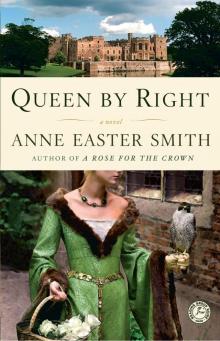 Queen By Right
Queen By Right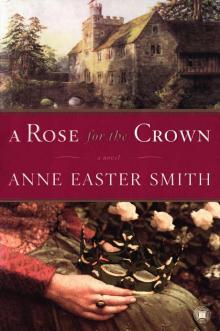 A Rose for the Crown: A Novel
A Rose for the Crown: A Novel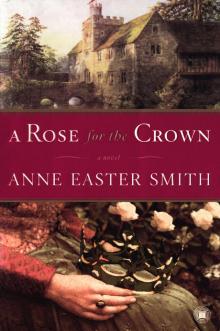 A Rose for the Crown
A Rose for the Crown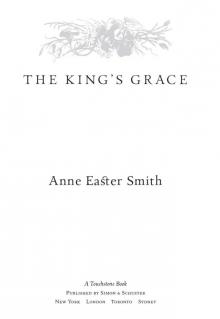 The King's Grace
The King's Grace Daughter of York
Daughter of York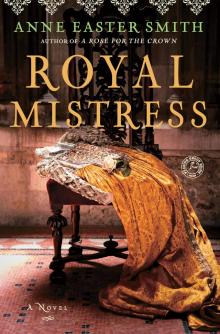 Royal Mistress
Royal Mistress